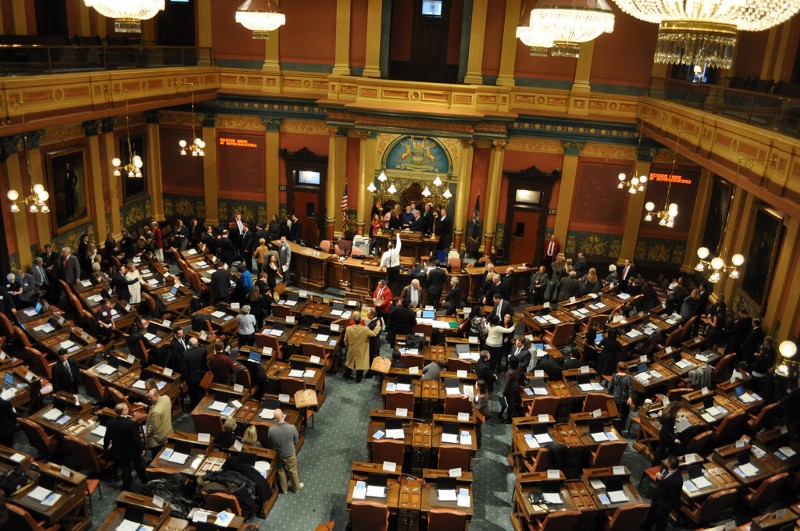State Legislatures, Trying to ‘Fix’ Free Speech Woes, Are Making Them Worse

By Will Haskell
From Lincoln, Nebraska, to Tallahassee, Florida, state legislators seem to think they’ve figured out how to protect Free Speech on college campuses. However, many bills under consideration in state capitals across the country are rooted in a fundamental misunderstanding of the First Amendment and could have a chilling effect on student speech.
Consider a problematic bill proposed earlier this year in Tallahassee: Florida’s Campus Free Expression Act would permit individuals to sue state universities and colleges for compensatory damages in the event their speeches are disrupted by student protesters. The damages could range up to $100,000 per incident in which a person’s “expressive rights” are allegedly violated.
On its face, this seems like an acceptable restriction on the so-called “heckler’s veto,” a circumstance in which noisy protesters prevent a speaker from being heard. Upon reflection, however, the bill raises more questions than it answers. For example, what does it mean to infringe upon the “expressive rights” of others? Who decides?
The American Civil Liberties Union of Florida, an organization one might expect to support a bill by such a name, has been a vocal critic of the proposal. Kara Gross, legislative counsel at the ACLU of Florida, noted that “anyone [could] bring a lawsuit alleging they were materially disrupted,” forcing colleges and universities to spend “significant resources” defending themselves in court. Gross told WUSF News that the bill stands to benefit people like Richard Spencer, a white supremacist, racist, and anti-Semite who regularly invites himself to speak on college campuses.
Similar bills have become law in Utah, Kentucky, and North Carolina. Since January 2017, at least 31 states have considered legislation that would impact the exercise of First Amendment freedoms. In Oklahoma, individuals who trespass on “critical infrastructure” such as pipelines and railways may now face fines of $100,000 and 10 years in prison. A bill in Oregon would require public community colleges and universities to expel any student convicted of participating in a violent riot.
Of course, some of the flurry of legislation is benign. The harmless, and perhaps even helpful, bills include demands for greater transparency in Free Speech policies or the elimination of the Free Speech zones that sometimes restrict open advocacy to a designated area on a college or university campus.
Yet many other bills constitute serious threats to the Free Speech of students. Michigan’s SB 349 would require public institutions of higher education to issue a one-year suspension or expulsion for students who have twice been found guilty of “infringing” upon the Free Speech rights of others. Tennessee’s SB 739 would ban public protests on campus that are disruptive or block entrances to campus buildings.
State legislators can be applauded for attempting to protect Free Speech on campus. Yet there’s a profound irony in politicians telling students to behave in a civil and calm manner at the very moment when political discourse is descending into name-calling, vitriol, and violence. In May 2017, for example, the Texas Senate told students to engage with controversial speakers on the merit of their ideas, prohibiting public institutions from “disinviting a speaker who has been requested to speak at the institution by member of the university community.” That same month, however, a physical brawl erupted across the Capitol on the floor of the Texas House of Representatives when legislators could not settle their differences over immigration issues in a civil manner; some threatened to step outside and resolve them in a gunfight, with the pistols they were carrying while doing their legislative business.
More fundamentally, legislators must remember that protests on campus, disrespectful as they may sometimes seem, play a key role in the United States’ social progress. After all, student protesters were responsible for desegregating lunch counters during the fight for civil rights in the 1950s and ’60s, and leading the demonstrations advocating an end to the war in Southeast Asia in the 1960s and ’70s. Those who think that discontented students have nothing new to offer to democracy today need look no further than the initiatives launched by the students who survived the high school shooting in Parkland, Florida, in February 2018. State legislators seeking to protect speech on campus ought to remember that student dissent is often valuable and always protected under the First Amendment, so long as it does not incite violence.
Will Haskell, a 2018 graduate of Georgetown University with a major in government and a minor in French, was the principal research assistant for the Free Speech Project during its first year. He is a candidate for the Connecticut Senate.